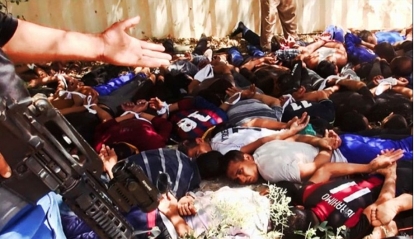IMAN Chairman condemns ongoing massacre of minorities in Iraq and Syria
Domingo, 17 Agosto 2014
Jihadis accused of new massacres in Iraq and Syria
BBC NEWS
Islamic State (IS) militants have been accused of massacring hundreds of people in areas under their control in northern Iraq and eastern Syria.
At least 80 members of the Yazidi religious minority are believed to have been killed with women and children abducted in a village in Iraq.
IS is also accused of killing 700 tribesmen opposing them in Syria's Deir Ezzor province, over a two-week period.
The violence has displaced an estimated 1.2 million people in Iraq alone.
US aircraft are providing air support for Kurdish forces in northern Iraq to drive back the militants and retake the strategic Mosul dam.
US Central Command said it carried out nine air strikes on Saturday, hitting targets near Irbil and the dam.
The strikes "destroyed or damaged four armoured personnel carriers, seven armed vehicles, two Humvees and an armoured vehicle," a statement said.
"All aircraft exited the strike areas safely."
The UK, Germany and other countries are delivering humanitarian aid for refugees in the north.
IS first emerged in Syria, fighting President Bashar al-Assad during the ongoing civil war there, but it has since overrun parts of northern Iraq, making its capital in the city of Mosul.
Pursuing an extreme interpretation of Sunni Islam, it has persecuted non-Muslims and Shia Muslims, whom it regards as heretics.
'Men and boys'
Kurdish and Yazidi sources say the attack on the Yazidis took place in the village of Kawju (also spelt Kocho), near the town of Sinjar, on Friday afternoon.
Reports say the men were killed after refusing to convert to Islam. A US drone strike later destroyed two vehicles belonging to the militants.
Men were separated from women and children under 12 years old and the men and male teenagers were led away in groups of a few dozen each and shot on the edge of the village, a wounded man who escaped by feigning death told AP news agency.
The fighters then walked among the bodies, using pistols to finish off anyone who appeared to still be alive, the 42-year-old man said by phone from an area where he was hiding, on condition of anonymity.
"They thought we were dead, and when they went away, we ran away," he said. "We hid in a valley until sundown, and then we fled to the mountains."
A Yazidi refugee from a different village, Moujamma Jazira, told AFP news agency that people there had also been massacred, after trying in vain to fight back.
Dakhil Atto Solo said that 300 men had been executed in his village, and the women and children abducted. The report could not be verified independently.
Meanwhile, UK-based Syrian opposition activists reported that IS had executed 700 members of the al-Sheitaat tribe in the oil-rich province of Deir Ezzor.
"Reliable sources" reported that many of the tribesmen had been beheaded, the Syrian Observatory for Human Rights said.
"Those who were executed are all al-Sheitaat," Observatory director Rami Abdelrahman told Reuters news agency by telephone. "Some were arrested, judged and killed."
The news comes after reports on social media in recent days of al-Sheitaat tribesmen being decapitated by militants, their severed heads left in public view in streets.
Tribesmen in the area had tried to drive out IS at the beginning of the month, in a rare display of local resistance. IS responded by rushing in reinforcements.
Responding to the news, IMAN Chairman, Ribal Al-Assad said:
"I am appalled to hear of the most recent massacres perpetrated by Islamists in Iraq and Syria, these are cold blooded and inhuman acts which speak volumes about the extremist mentality.
Whilst I am pleased to see that the international community is providing some humanitarian and tactical support, it is clear that far more needs to be done.
We cannot allow Islamism to take hold in Iraq or Syria, the consequences would be unthinkable.
The international community must do more to confront this problem, with each day that passes the Islamist movement grows stronger and the bloodshed continues. How many more people have to die at the hands of these animals before the international community comes together to put an end to this barbarity?"